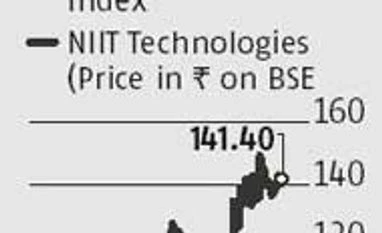NIIT Technologies has posted the biggest advance globally by an information technology company since March after turning away from domestic government projects that don't always pay on time.
The shares are up 74 per cent from a March 25 low, the most in Bloomberg Intelligence's Global IT Services Commercial Competitive Peers index. The shift last year to a reduced focus on government programs helped profit margins, Chief Executive Officer Arvind Thakur said in an interview.
"When the program gets delayed or I don't get paid, it starts impacting," he said. "One of the reasons why you're seeing our stock price running up is because we've started de-focusing on these large programs and shifted our energies to global markets. Our margins improved dramatically."
NIIT Technologies' experience shows the challenge Prime Minister Narendra Modi faces to implement his ambitious $18 billion Digital India initiative, whose goals are to expand broadband Internet access and put more government services online. Companies working on official projects sometimes face a byzantine bureaucracy and delays, even as Modi tries to make it easier to do business in India.
JS Deepak, India's information technology secretary, said companies are getting paid.
"Government work is being done in volume," Deepak said. "It's possible in some sections, because of operational issues, some issues have arisen. But even for those few cases, the government is committed to getting it done. And it is getting done."
Stock consolidating?
NIIT Technologies, which provides software solutions and information technology consultancy, fell 0.8 per cent to Rs 589.65 in Mumbai on Wednesday. The stock trades at 12.3 times projected 12-month earnings, higher than the five-year mean of 8, data compiled by Bloomberg show. The valuation reached 13.1 times on November 17, the most expensive in eight years.
"The stock would consolidate at the current level," said Shradha Agarwal, an analyst at Asian Markets Securities Pvt in Mumbai who has a buy rating on the shares. "Most of the positives are factored in."
A high-speed Internet grid to connect villages across the nation of 1.3 billion people is running behind its original schedule for completion by 2013, providing one example of how projects get bogged down. India is considering doubling spending on the grid to Rs 70,000 crore ($10.5 billion), Communications Minister Ravi Shankar Prasad said in May.
Digital services
NIIT Technologies is focusing increasingly on so-called digital services work in the private sector, where projects cover areas such as social media and mobile browsing, Thakur said, adding the sector offers better profit margins than government contracts.
NIIT Technologies reported net income of Rs 68.2 crore July through September, exceeding analysts' estimates of Rs 64.1 crore. Operating margin rose 135 basis points from the prior quarter.
The company specializes in industries including financial services and travel, with the bulk of revenues coming from overseas. Clients include British Airways, Cathay Pacific Airways and Emirates Airline, Thakur said.
"As our dependence on government projects reduces, and as we go more and more digital, our profile is only going to improve," he said.
The shares are up 74 per cent from a March 25 low, the most in Bloomberg Intelligence's Global IT Services Commercial Competitive Peers index. The shift last year to a reduced focus on government programs helped profit margins, Chief Executive Officer Arvind Thakur said in an interview.
"When the program gets delayed or I don't get paid, it starts impacting," he said. "One of the reasons why you're seeing our stock price running up is because we've started de-focusing on these large programs and shifted our energies to global markets. Our margins improved dramatically."
NIIT Technologies' experience shows the challenge Prime Minister Narendra Modi faces to implement his ambitious $18 billion Digital India initiative, whose goals are to expand broadband Internet access and put more government services online. Companies working on official projects sometimes face a byzantine bureaucracy and delays, even as Modi tries to make it easier to do business in India.
JS Deepak, India's information technology secretary, said companies are getting paid.
"Government work is being done in volume," Deepak said. "It's possible in some sections, because of operational issues, some issues have arisen. But even for those few cases, the government is committed to getting it done. And it is getting done."
Stock consolidating?
NIIT Technologies, which provides software solutions and information technology consultancy, fell 0.8 per cent to Rs 589.65 in Mumbai on Wednesday. The stock trades at 12.3 times projected 12-month earnings, higher than the five-year mean of 8, data compiled by Bloomberg show. The valuation reached 13.1 times on November 17, the most expensive in eight years.
"The stock would consolidate at the current level," said Shradha Agarwal, an analyst at Asian Markets Securities Pvt in Mumbai who has a buy rating on the shares. "Most of the positives are factored in."
A high-speed Internet grid to connect villages across the nation of 1.3 billion people is running behind its original schedule for completion by 2013, providing one example of how projects get bogged down. India is considering doubling spending on the grid to Rs 70,000 crore ($10.5 billion), Communications Minister Ravi Shankar Prasad said in May.
Digital services
NIIT Technologies is focusing increasingly on so-called digital services work in the private sector, where projects cover areas such as social media and mobile browsing, Thakur said, adding the sector offers better profit margins than government contracts.
NIIT Technologies reported net income of Rs 68.2 crore July through September, exceeding analysts' estimates of Rs 64.1 crore. Operating margin rose 135 basis points from the prior quarter.
The company specializes in industries including financial services and travel, with the bulk of revenues coming from overseas. Clients include British Airways, Cathay Pacific Airways and Emirates Airline, Thakur said.
"As our dependence on government projects reduces, and as we go more and more digital, our profile is only going to improve," he said.
)